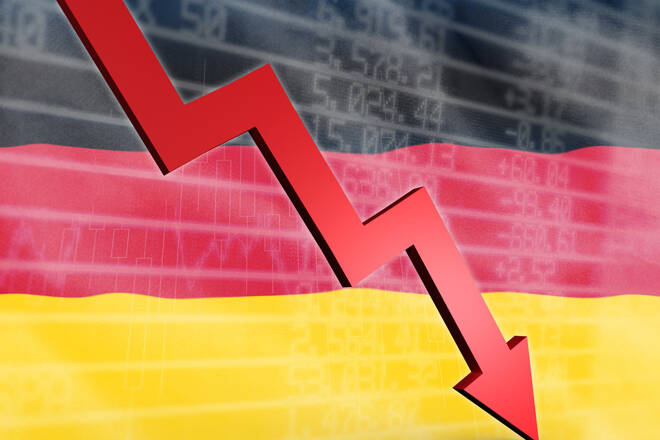Advertisement
Advertisement
European Equities: A Week in Review – 04/03/22
By:
Russia's continued invasion of Ukraine and capture of Europe's largest nuclear power plant overshadowed upbeat economic data from the week.
The Majors
The European majors nosedived in the week ending 4th March, with Russia’s invasion of Ukraine delivering the worst week since 2020.
The EuroStoxx600 tumbled by 7.00%, with the CAC40 and the DAX ending the week down by 10.11% and by 10.23%, respectively.
Economic data took a back seat once more, with Russia’s bombing of civilian targets and capture of Europe’s largest nuclear plant hitting market risk sentiment. Failure by the West to defuse the situation with hefty sanctions also added to the market angst.
The Stats
Private sector PMIs for February and the German economy were in focus throughout the week.
Better than expected private sector PMI numbers for Italy and Spain were market positive. With France and Germany also seeing private sector activity pick up in February, the Eurozone’s composite PMI increased from 52.3 to 55.5.
From Germany, the unemployment rate fell from 5.1% to 5.0%, with Germany’s trade surplus widening from €8.1bn to €9.4bn in January.
Other stats included finalized February inflation figures for member states and the Eurozone and retail sales and unemployment numbers for the Eurozone. The numbers failed to draw interest, however.
From the U.S
Private sector PMIs and nonfarm payrolls were the key stats of the week.
In February, the ISM Manufacturing PMI rose from 57.6 to 58.6, while the Non-Manufacturing PMI fell from 59.9 to 56.5.
While the services PMI disappointed, nonfarm payrolls jumped by 678k in February. As a result of another marked increase in hiring, the unemployment rate fell from 4.0% to 3.8%.
FED monetary policy was in focus on Wednesday, with FED Chair Powell delivering testimony on Capitol Hill. Talk of a more cautious move later this month spurred demand for riskier assets. Powell told lawmakers: “there are events yet to come and we don’t know what the real effect on the U.S. economy will be.” The FED Chair reportedly added that he favored a 25 basis point rate hike in March and then larger and more frequent rate hikes if needed.
From Elsewhere
Private sector PMIs from China were also market positive. In February, the all-important Caixin Manufacturing PMI rose from 49.1 to 50.4, with the services PMI up from 49.1 to 50.4.
The Market Movers
From the DAX, it was a particularly bearish week for the auto sector. Continental and Volkswagen tumbled by 21.76% and by 22.03%, with BMW and Daimler ending the week down by 16.95% and by 19.51%, respectively.
It was a dire week for the banking sector. Deutsche Bank slumped by 22.98%, with Commerzbank tumbling by 26.81%.
From the CAC, it was a grim week for the banks. Soc Gen slumped by 26.85%, with BNP Paribas and Credit Agricole ending the week with losses of 16.85% and 17.33%, respectively.
Things were not better for the French auto sector. Stellantis NV slid by 18.14%, with Renault down 24.32%.
Air France-KLM ended the week down by 13.30%, with Airbus sliding by 16.24%.
On the VIX Index
It was back into the green for the VIX in the week ending 4th March, marking the 5th rise in 8 weeks.
Reversing a 0.58% decline from the previous week, the VIX rose by 15.91% to end the week at 31.98.
3-days in the green from 5 sessions, which included a 9.28% rise on Monday and a 10.51% jump on Tuesday delivered the upside.
For the week, the NASDAQ slid by 2.78%, with the Dow and the S&P500 falling by 1.30% and 1.27%, respectively.
The Week Ahead
It’s another busy week ahead on the Eurozone economic calendar. The German economy will be in focus, with retail sales, factory orders, and industrial production due out. For the Eurozone, 4th quarter GDP numbers should have a muted impact on the majors on Tuesday.
On the monetary policy front, the ECB monetary policy decision and press conference on Thursday will likely overshadow the stats, however. Surging fuel prices amidst the current inflation environment coupled with Russia’s invasion of Ukraine brings significant economic and policy uncertainty. With the ECB in focus, the EU Leaders Summit late in the week will also be a key driver.
From the U.S, inflation and jobless claims figures will draw interest, with inflation likely to have the greater impact. Stats from China will also provide direction, with trade data and inflation figures due out.
While the stats will draw interest, geopolitics will remain the key driver. The markets will be looking for some progress towards ending Russia’s invasion of Ukraine. A continued Russian escalation will deliver another blow to the European majors.
About the Author
Bob Masonauthor
With over 28 years of experience in the financial industry, Bob has worked with various global rating agencies and multinational banks. Currently he is covering currencies, commodities, alternative asset classes and global equities, focusing mostly on European and Asian markets.
Advertisement
